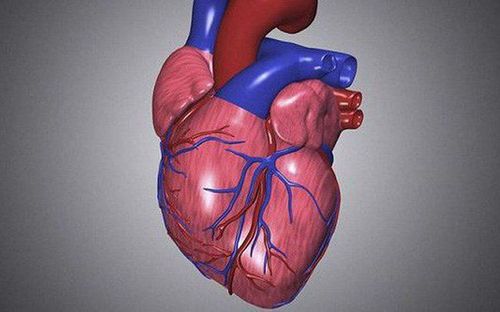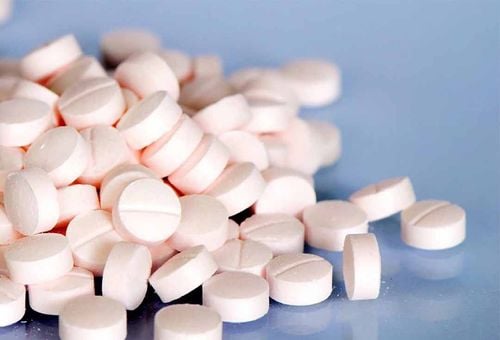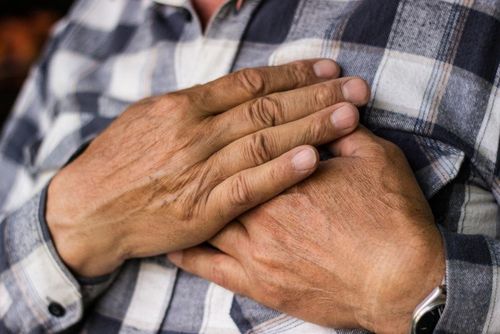This is an automatically translated article.
The article is professionally consulted by Specialist Doctor I Tran Quoc Vinh - Emergency Doctor - Department of Resuscitation - Emergency - Vinmec Nha Trang International General Hospital.A heart attack (myocardial infarction) occurs when there is a sudden blockage of a coronary artery, causing a lack of blood to part of the heart muscle. With timely emergency care, the patient can fully recover, that is, return to normal activities as before. According to statistics in the UK, there are more than 915,000 Britons still alive after experiencing a heart attack.
According to the advice of cardiologist Andrew Archbold from BMI The London Independent Hospital: “Patients who have had a heart attack will not be discharged unless the doctor examines and concludes that there is no such thing as a heart attack. dangerous condition for the patient's case. In the case of a mild heart attack, when the heart returns to normal, the patient can be discharged within 48 hours."
Depending on the severity of the disease and the body's response after a heart attack, but the patient's health will recover faster if they know how to rest, relax, control their mood, keep their spirits up. relaxed spirit, avoid stress, stress.
1. Exercising after a heart attack
Physical activities such as regular exercise and sports are very good if done appropriately and properly, and this is also one of the core contents of the Cardiovascular Rehabilitation Program. cardiac rehabilitation programme).Today, the path to recovery after experiencing a heart attack is no longer bed rest. Instead, the patient is encouraged to be active, however, the level and intensity of activity will be determined by the doctor based on the heart damage that the patient has experienced.
Before being discharged from the hospital, the patient will be thoroughly counseled on post-discharge issues, including an exercise program whose level and intensity will be gradually increased to a level suitable for the individual patient. core. Most commonly, most patients are advised to spend 20 minutes of each session per day for 4 to 6 weeks in activities such as walking, cycling or swimming.
Note: In sports training activities, weightlifting (or lifting heavy objects) is not recommended for a certain period of time initially. When performing weightlifting, the patient's blood pressure will increase, creating pressure on the heart that is not conducive to the patient's recovery process.

2. Does the patient need to change the diet during the recovery process?
Overweight and obesity will increase the risk of heart attack, so for overweight or obese patients, during the rehabilitation process of cardiovascular function will have to change the diet, in order to reduce muscle mass. until an appropriate Body Mass Index (BMI) is reached.Dietary changes will begin with limiting or completely avoiding foods that increase the risk of coronary heart disease. Prioritize meals with lots of fresh fruits and vegetables, use olive oil, nuts and whole grains, along with fish dishes, especially oily fish (because it contains lots of healthy omega-3 fats).
3. Quit smoking
If you are a smoker, you should quit immediately. Smokers face almost twice the risk of having a heart attack than the average person who has never smoked. Quitting smoking can be difficult at times, and if you can't do it on your own, consult your doctor for the best help.
4. When can the patient return to work?
The time when the patient can return to work sooner or later depends on the nature of work and the patient's medical condition. If it is a simple office job, the patient can return to work after a few weeks, but if it is a job that requires physical activity, it is obvious that the patient will not be able to return to work anytime soon. Before returning to work, the patient needs to be examined and approved by a specialist in which the patient's condition has allowed him to return to work.5. Is re-examination with the patient necessary?
The biggest cause of heart attack is coronary artery disease, so patients need to have regular post-heart attack follow-up visits to control their risk factors for coronary artery disease. At a minimum, patients need to have their blood pressure checked and their cholesterol checked once a year.For patients who are prescribed medication after experiencing a heart attack, remember to follow the doctor's instructions, because strict adherence to treatment will help the patient reduce the risk. faced a heart attack again.
6. Sex with a patient who has had a heart attack
Once the patient feels well, he or she can have sex, usually about four weeks after the heart attack. Sex is also a type of physical activity, so like any other physical activity, the patient can fully conduct and enjoy it.However, some medications can affect a patient's sex, such as beta-blockers, which can cause unwanted effects such as decreased sexual interest and erectile dysfunction in women. male. If there are any difficulties in having sex, consult a therapist for solutions.
Myocardial infarction is one of the dangerous conditions of the cardiovascular system, which can lead to death at any time. Timely detection and treatment of the disease is essential to help patients recover quickly, while minimizing complications after infarction as well as the risk of death.
Doctor Tran Quoc Vinh has more than 6 years of working experience (starting in 2011) in the field of Emergency Medicine, he used to work at the Emergency Department of Khanh Hoa Provincial General Hospital, participated in medical examination and treatment. for many clinics in Nha Trang area before becoming a doctor of emergency department at Vinmec Nha Trang International General Hospital as it is today.
Vinmec International General Hospital has applied the method of using thrombolytic drugs to treat patients with myocardial infarction. Currently, the treatment cases have a success rate of up to 95% and most of them have no complications after treatment.
Please dial HOTLINE for more information or register for an appointment HERE. Download MyVinmec app to make appointments faster and to manage your bookings easily.














